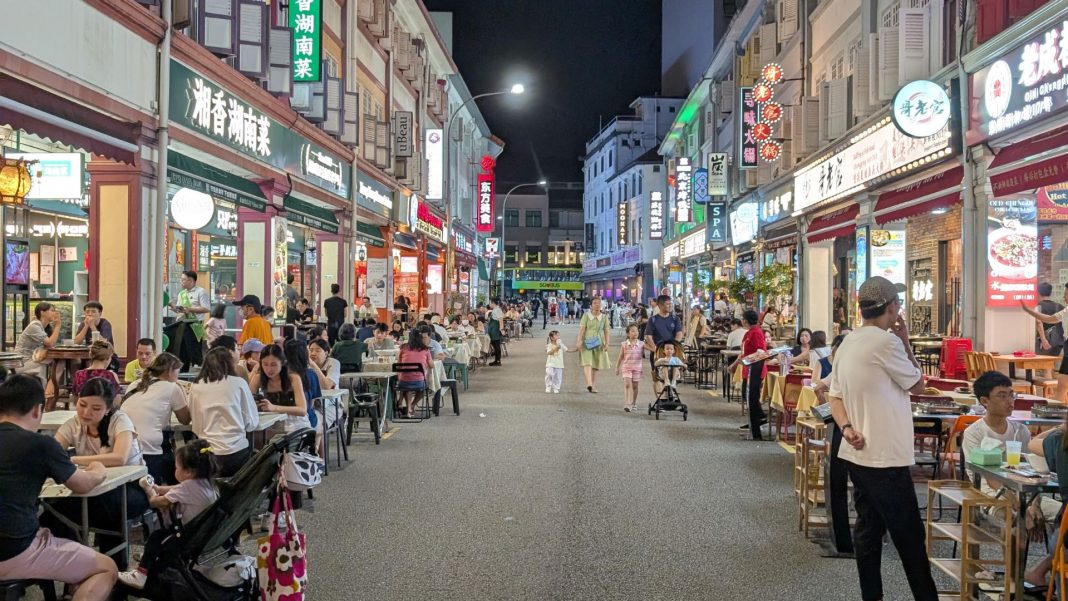SINGAPORE: A viral Reddit post has reignited the conversation on language accessibility and integration, after a Singaporean user shared their frustrations about the lack of English signage in a growing number of Mainland Chinese eateries across the island.
The post, which quickly surged past 2,200 upvotes on r/singapore, was written by a self-described Indian Muslim Singaporean who expressed interest in Chinese cuisine and cultural exchange, but felt alienated by the linguistic exclusivity of some retail outlets.
“I would love to try more Northern Chinese cuisines if there are halal options,” he shared. “But I don’t mind the vast majority of them not being halal. This isn’t meant to be political, but rather a personal concern.”
The user clarified that their frustration wasn’t with major brands like Haidilao, Luckin Coffee, or Chagee but with the smaller PRC eateries popping up in areas like Bugis and Clementi, where menus, promotions, and even staff communication are often almost entirely in Chinese.
“Having only the Chinese language means you are excluding non-Chinese people and even some Chinese Singaporeans who struggle with their Mother Tongue… English is a common language here, and the lack of it makes it seem they do not really want to expand their business’ clientele outside the PRC immigrant population,” the post continued.
Even when English was present, it was often an afterthought: tiny fonts, poor translations, or only partial information provided — a situation the user found both unwelcoming and unnecessary.
Many Singaporeans feel the same way
What stood out in the comments was not just support from minority communities, but from Chinese Singaporeans themselves, who echoed concerns about social cohesion and national identity.
“As a bilingual Chinese, I feel you,” one user wrote, garnering over 1000 upvotes.
“To me, English is the language that’s supposed to bridge the social divide between races… when businesses do not care to use English, it feels like we’re taking a step backwards in social integration.”
Another popular comment went further, suggesting deeper implications:
“The proliferation of such food stalls is part of a self-reinforcing loop that feeds a burgeoning PRC expat bubble…The key difference is the minimal use of English in storefronts, menus, signages, apps, and customer communications. Locals patronising such stores are bonus revenue. What if you, the local, were never their target audience to begin with?”
This comment, too, wasn’t alone in highlighting broader geopolitical concerns, suggesting that some PRC businesses may be setting up shop in Singapore not solely for profit, but due to external economic pressures in China or as vehicles for capital outflow.
What about inclusion and citizenship?
One particularly pointed comment asked why new citizens aren’t required to meet a basic English language threshold, noting how the lack of shared language undermines efforts toward social harmony: “I really wish there is an English test for new citizens to at least make the non-Chinese Singaporeans feel more included.”
A call for common ground
At its core, this thread was not a rant, but a collective call for accessibility, mutual respect, and cultural integration.
While Singapore has always been a multiracial society with a rich linguistic heritage, English has long served as the default bridge between communities, and in a landscape where PRC eateries are becoming a daily fixture, many Singaporeans are asking for a baseline level of linguistic accessibility in shared public spaces.
Because inclusion is not just about race or religion, it starts with language and the ability to read the menu.
A general ruling to mandate that signs, menus, and storefronts carry both English and the preferred language of the business, many suggested, would go a long way in ensuring every Singaporean feels at home, not just the ones who speak the language.

